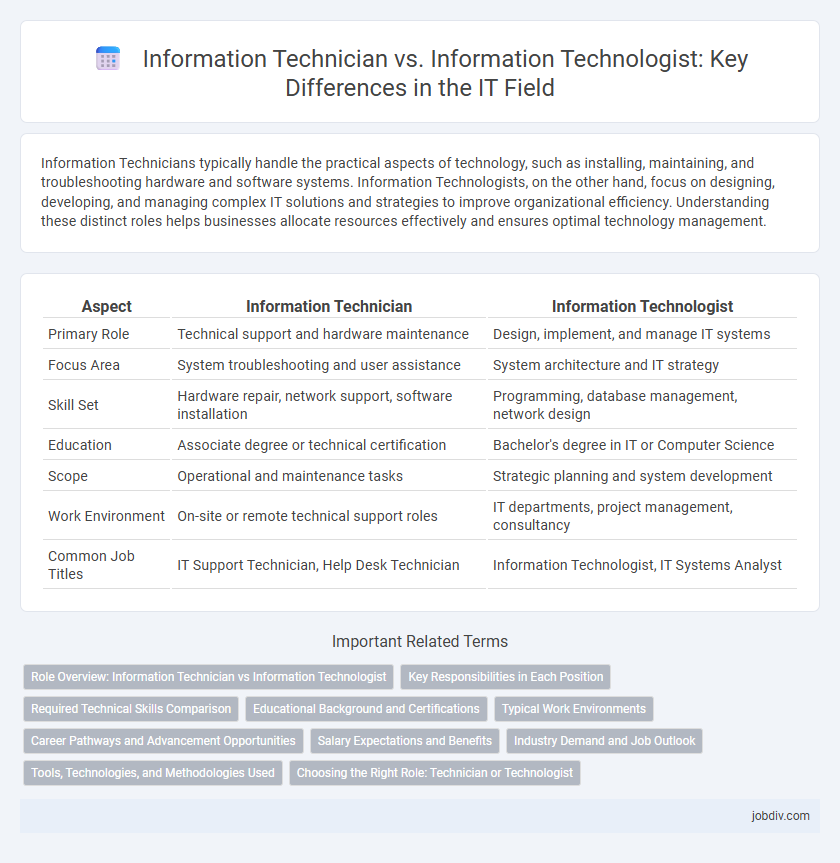Information Technicians typically handle the practical aspects of technology, such as installing, maintaining, and troubleshooting hardware and software systems. Information Technologists, on the other hand, focus on designing, developing, and managing complex IT solutions and strategies to improve organizational efficiency. Understanding these distinct roles helps businesses allocate resources effectively and ensures optimal technology management.
Table of Comparison
| Aspect | Information Technician | Information Technologist |
|---|---|---|
| Primary Role | Technical support and hardware maintenance | Design, implement, and manage IT systems |
| Focus Area | System troubleshooting and user assistance | System architecture and IT strategy |
| Skill Set | Hardware repair, network support, software installation | Programming, database management, network design |
| Education | Associate degree or technical certification | Bachelor's degree in IT or Computer Science |
| Scope | Operational and maintenance tasks | Strategic planning and system development |
| Work Environment | On-site or remote technical support roles | IT departments, project management, consultancy |
| Common Job Titles | IT Support Technician, Help Desk Technician | Information Technologist, IT Systems Analyst |
Role Overview: Information Technician vs Information Technologist
Information Technicians typically handle the installation, maintenance, and troubleshooting of hardware and software systems to ensure operational efficiency in IT environments. Information Technologists focus on designing, implementing, and managing complex information systems and networks to support organizational goals and strategic initiatives. The primary distinction lies in the technician's hands-on support and repair role versus the technologist's strategic planning and system integration responsibilities.
Key Responsibilities in Each Position
Information Technicians primarily focus on maintaining, troubleshooting, and repairing hardware and software systems to ensure operational efficiency. Information Technologists oversee the design, implementation, and management of complex information systems, including network architecture, data security, and system integration. Technicians handle day-to-day technical support and infrastructure maintenance, while Technologists engage in strategic planning and technology development aligned with organizational goals.
Required Technical Skills Comparison
Information Technicians require hands-on skills in hardware troubleshooting, network configuration, and system maintenance, ensuring the operational integrity of IT infrastructure. Information Technologists prioritize advanced technical expertise in software development, database management, cybersecurity, and IT project management. Both roles demand proficiency in operating systems, scripting languages, and IT support tools, but Information Technologists typically engage with strategic technology implementation and innovation.
Educational Background and Certifications
Information Technicians typically possess an associate degree or technical diploma in information technology or computer science, focusing on foundational skills such as hardware maintenance and network troubleshooting. Information Technologists often hold a bachelor's degree or higher in information technology, computer science, or related fields, emphasizing advanced knowledge in systems analysis, software development, and IT project management. Certifications like CompTIA A+ or Network+ are common for Information Technicians, while Information Technologists may pursue advanced credentials such as CISSP, PMP, or Microsoft Certified: Azure Solutions Architect Expert to validate specialized expertise.
Typical Work Environments
Information Technicians typically work in hands-on environments such as data centers, IT support desks, and network operations centers where they maintain and troubleshoot hardware and software systems. Information Technologists are often found in strategic and managerial settings including corporate IT departments, technology consulting firms, and project management offices, focusing on system design, implementation, and integration. Both roles may operate within government agencies, educational institutions, and private sector companies, but their work environments reflect differing levels of technical versus strategic responsibilities.
Career Pathways and Advancement Opportunities
Information Technicians often begin their careers in entry-level roles focused on hardware support, system maintenance, and basic network troubleshooting, with advancement opportunities leading to specialized technician roles or supervisory positions. Information Technologists typically engage in more complex tasks such as IT infrastructure design, software development, and strategic technology planning, offering pathways toward roles like IT manager, systems analyst, or CIO. Career progression for Information Technicians often involves gaining certifications like CompTIA A+ or Cisco CCNA, while Information Technologists benefit from advanced degrees and certifications in areas such as cloud computing, cybersecurity, and project management.
Salary Expectations and Benefits
Information Technologists typically earn higher salaries than Information Technicians due to their advanced skills in system design, network architecture, and cybersecurity, with average annual earnings ranging from $70,000 to $110,000. Information Technicians generally receive salaries between $45,000 and $65,000, focusing on support, maintenance, and hardware troubleshooting. Benefits for Information Technologists often include comprehensive health plans, professional development allowances, and stock options, whereas Information Technicians receive standard health benefits and paid time off.
Industry Demand and Job Outlook
Information Technologists face stronger industry demand due to their focus on strategic IT implementation and management, leading to broader career opportunities in sectors like healthcare, finance, and cybersecurity. Information Technicians primarily support day-to-day technical operations, with steady demand concentrated in maintenance and helpdesk roles. Job outlook for Information Technologists is projected to grow faster than average, driven by digital transformation trends, while Information Technician roles experience moderate growth tied to ongoing IT infrastructure support.
Tools, Technologies, and Methodologies Used
Information Technicians primarily utilize hardware repair tools, network diagnostic software, and basic scripting languages to maintain and troubleshoot IT infrastructure. Information Technologists leverage advanced programming languages, enterprise software solutions, cloud computing platforms, and cybersecurity frameworks to design, implement, and manage complex information systems. Both roles employ methodologies such as ITIL for service management and Agile for project development, with Technologists typically engaging in more strategic technology planning and integration.
Choosing the Right Role: Technician or Technologist
Choosing between an Information Technician and an Information Technologist depends on career goals and skill sets; technicians focus on hardware maintenance, technical support, and troubleshooting, while technologists engage in system design, implementation, and advanced IT solutions. Employers often seek technicians for hands-on, entry-level roles, whereas technologists typically fill strategic positions requiring broader knowledge of software development, network architecture, and project management. Understanding these distinctions helps candidates align their education and experience with industry demands for optimized career growth in IT.
Information Technician vs Information Technologist Infographic

 jobdiv.com
jobdiv.com